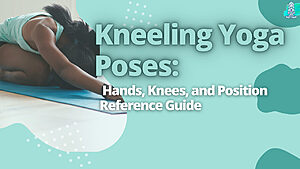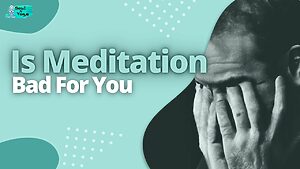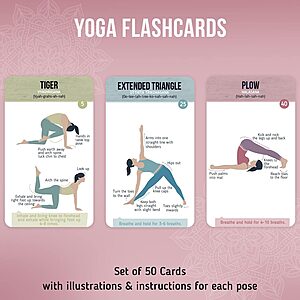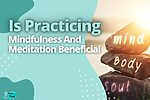Many people assume that meditation can only be done during the day. But is that true?
It turns out that meditation can be done at any time of the day. Meditation is a relaxing practice that improves your health and well-being.
In this article, I’ll explain how you can meditate at night and why meditating at night can be highly beneficial.
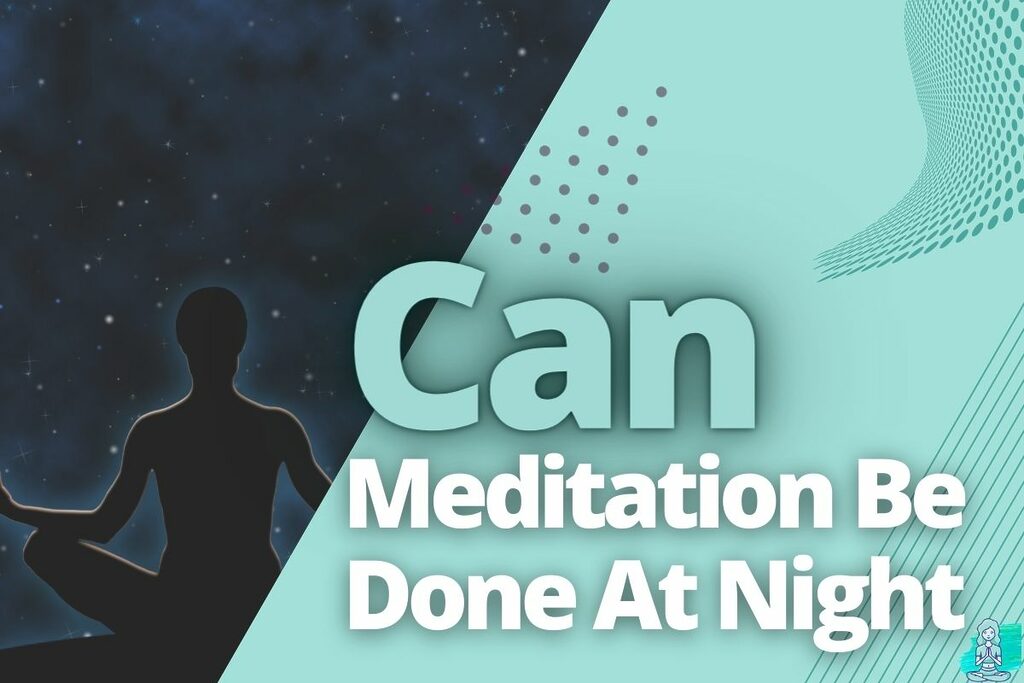
Here’s The Answer To Can Meditation Be Done At Night
Yes, meditation can be done at night. However, this may not be the best moment if you have a full day ahead of you. The night is when the body heals itself, which keeps one asleep for longer periods.
Hence, it’s better to do meditation in the morning or during daytime hours if possible. Since meditation induces relaxation, it’s best to practice it at a time when one can relax.
A busy lifestyle may necessitate newcomers to meditation practice in the morning or afternoon. After meditating frequently, you can gradually increase the amount of time you spend doing so at night.
In fact, practicing meditation at night is a great way to unwind and relax before bed. One should be comfortable while meditating and not sleepy or drowsy.
Will It Be Easier To Meditate At Night?

As you can see, meditation can be done at any time. Everyone, regardless of age or experience, can benefit from meditation. You don’t have to do it simultaneously every day; it’s not a competition or a race!
Meditating in the evening can be more convenient for many people. There are several reasons why this is happening.
- There are fewer distractions at night. This can help the beginner meditator to focus more easily on the meditation technique.
- The quality of sleep is often better when people meditate at night. This is because regular meditation can help calm the mind and body, making it easier to fall asleep.
- Meditating at night can help to establish a nightly routine. This can be helpful for people who suffer from insomnia or other sleep disorders. Meditating first thing at night can help ensure that they get a good night’s sleep.
If you want to try meditating during nighttime hours, that is perfectly fine, and many benefits come with doing so.
However, if you prefer to sit in silence while your body rests and rejuvenates itself naturally, then there is nothing wrong with that.
What Are The Benefits Of Meditating Before Bed?
The most significant advantage is that it has the potential to enhance the quality of your rest. Many mental health concerns, including anxiety and sadness, can be caused by a lack of sleep.
By meditating before bed, you can help improve your sleep quality and reduce your risk of developing these issues. Another benefit of meditating before bed is that it can help improve your sleep hygiene.
Sleep hygiene is called habits and practices that help you get a good night’s sleep. Maintaining a regular sleep schedule, avoiding caffeine and alcohol before bed, and having a tranquil and relaxing sleep environment are some of the essential parts of good sleep hygiene.
Meditating before bed can help improve your sleep hygiene and get the best night’s sleep possible.
Finally, meditating before bed can also help improve your overall mood. One of the most effective strategies to alleviate stress and anxiety is to get a good night’s sleep.
How Long Should You Meditate At Night?
How long you meditate depends on your goals and how much time you have to spare. Five minutes is all it takes to unwind and unwind your mind and body.
If you want lasting benefits, then 10 or 20 minutes of meditation is recommended. But if there’s one thing that’s clear about this question: The longer, the better!
The key here is to not stress out about whether or not your session has been too short or too long. Instead, focus on finding what feels suitable for YOU and stick with it until it becomes a habit (which should happen within two weeks).
How To Prepare For Meditation At Night?
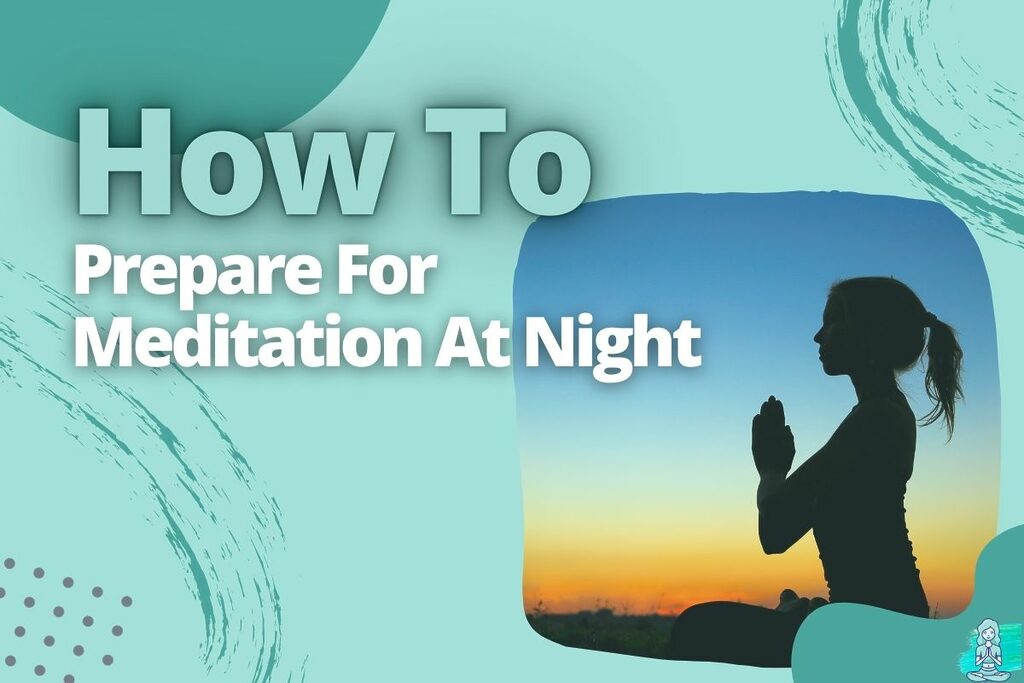
- The first step to meditation at night is preparing yourself. You should take a shower or do some light exercise to get your body ready for the challenges of meditation.
- Next, try to clear your mind of negative thoughts and feelings. Try thinking about something positive, or just focus on breathing in and out slowly until you feel relaxed enough.
- Finally, make it a habit to meditate every night before going to bed to start having a better sleep!
Are There Any Risks Involved With Meditation Done At Night?
There are some risks associated with meditation done at night. While sitting up, it’s possible to feel too comfortable and fall asleep.
This isn’t bad unless you have something else that needs doing the following day or if you plan on getting up early, so don’t worry too much about this.
It’s also possible that you might wake up tired after meditating before bedtime because meditation can help release stress hormones into your bloodstream (you know those feel-good endorphins everyone talks about?).
Again, this isn’t entirely bad because those hormones will help put you in a good mood for the rest of the night.
Finally, there is always the risk that a thought or image pops into your mind if something comes up during your meditation session. It could wake you from sleep later in the night and keep you awake for hours trying to solve whatever problem during meditation.
Do People Usually Meditate After Eating?
After eating, it’s best not to meditate. While digesting food, your body is busy absorbing nutrients and processing food. This can make meditation more difficult since the process of digesting is distracting.
Additionally, if you are feeling sleepy after a meal, staying focused on your breath or mantra while lying down with your eyes closed can be challenging.
If you want to meditate right after eating (for whatever reason), ensure that there isn’t too much sugar in what you’ve eaten. Sugar produces a rapid rise and decrease in blood sugar levels, resulting in drowsiness and fatigue.
What Are The Disadvantages Of Meditating At Night?
There are a few disadvantages to meditating at night.
- First, it can be hard to concentrate on your meditation practice if you’re not used to doing it at night.
- The second is that you might not be able to sleep, or if you do fall asleep during your session, then there’s a chance that the rest of your evening will be ruined with tossing and turning or feeling groggy when morning comes around.
- Another problem is that if you’re too tired from being up all night trying to meditate, then maybe there isn’t enough time for proper relaxation into sleep before waking up again for work or school in the morning. But even worse than these issues would be falling asleep mid-meditation!
How To Meditate Effectively At Night?
To meditate effectively at night, try the following:
- Attempt to meditate for at least twenty minutes each day. If you’re just starting with meditation, especially with a busy schedule, 20 minutes is an ideal goal. When you’re done, you won’t feel like you’ve wasted your time or effort since your mind has had time to settle down and reap some of the benefits of meditation (such as increased attention).
- Try sitting somewhere quiet and comfortable where nobody else will bother you during this period. This could be in bed if there’s no other option available. But ideally, it would be on the floor with pillows around as support under your knees or head if possible so as not to disrupt any sleeping person in bed next door.
- You might even want something soft playing music to avoid distracting you further with noises coming from outside too much either way.
Will, You Be More Productive If You Meditate At Night?
- Meditation can help you sleep better.
- Meditation can help you relax.
- Meditation can improve your mental clarity and concentration.
- Meditation is a proven technique to deal with stress, and dealing with it is an essential part of being productive in any field that requires it (and these days, most of them do).
If We Cant Meditate At Night, Then When Should We Do It?
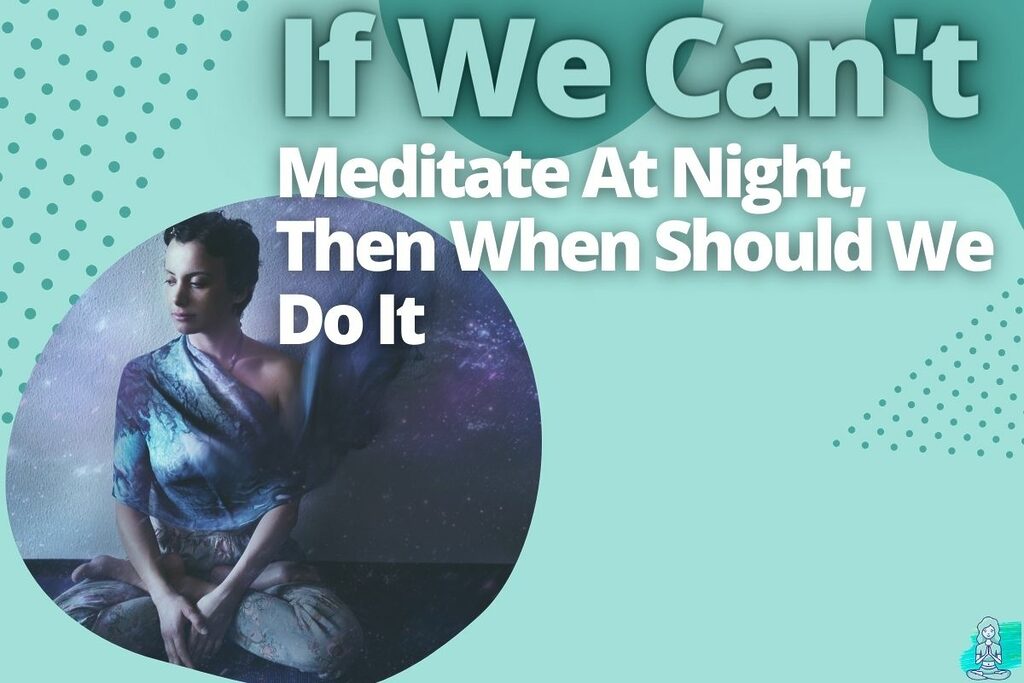
You should be aware of a few factors if you are experiencing difficulty meditating. Meditation should be done when you can be undisturbed, so ensure this is the case before you begin.
If you have children or pets, try meditating before they wake up in the morning or while they sleep at night. The second thing people need to do is figure out their ideal time of day for when they want their minds to be still and focused on one thing: themselves and no one else.
It may take some experimentation, but once these steps have been taken, finding the right time for us will become much easier!
How Long Should You Meditate For At Night?
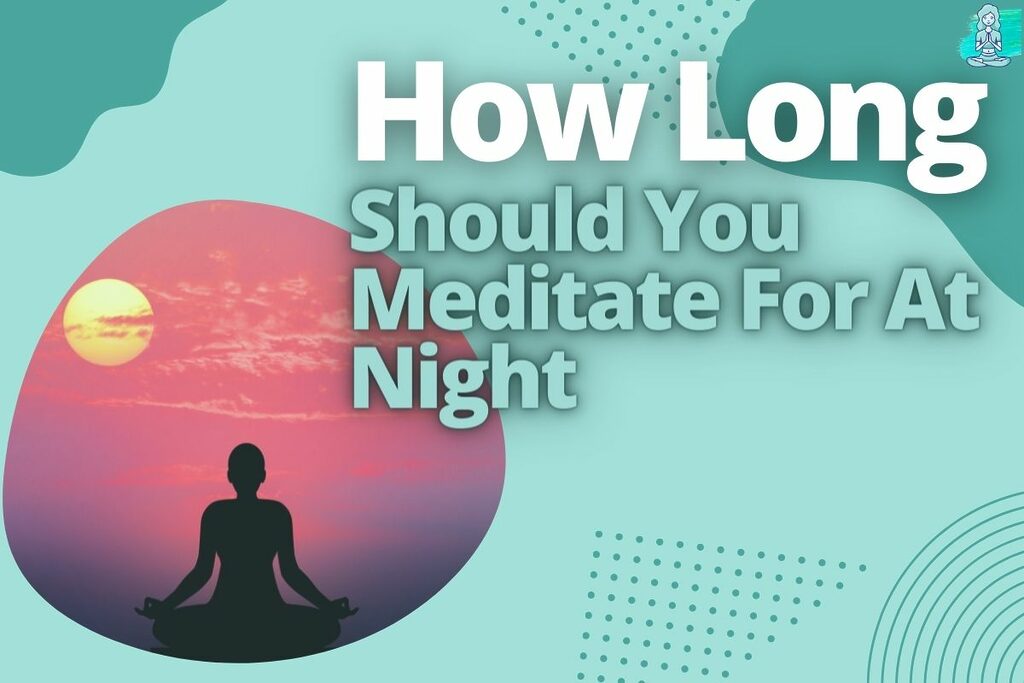
You can meditate anytime and for as long as you like. There are no set rules about how long to meditate or what time of day is best. Meditation can help you find inner peace, clarity, and focus at any point in the day.
If you’re new to meditation, it’s best to start with short sessions and gradually increase the length of time you meditate for. A good rule of thumb is to meditate for 10-20 minutes daily. Once you’re comfortable with this, you can increase the length of your sessions as needed.
It’s also important to find a comfortable position when you’re meditating. You can sit in a chair with your feet on the ground or lie down on your back with your eyes closed. You should be aware of a few factors if you are experiencing difficulty meditating. Meditation should be done when you can be undisturbed, so ensure this is the case before you begin.
Many different meditation apps and audio recordings are available to help you get started with meditation. If you’ve discovered a method that works best for you
Conclusion
This blog post discussed the benefits of meditating at night and how it can be done effectively. We also discussed what time of day is the best time to meditate at night. We also explained how meditation could help you sleep better and get a better night’s sleep.
Meditation is done by focusing on a particular subject and clearing your mind of distractions. It is also recommended that you try to do it before going to bed.
Meditation helps you to sleep better and get a better night’s sleep. It does so by improving the quality of your sleep. You should therefore meditate before going to bed if you have difficulty sleeping.
Meditation can be done anywhere. It is done by focusing on a subject and clearing your mind of distractions. It can be done while working, driving, or relaxing. You can also practice it at night if you want to.
If you are interested in meditation, we recommend you look at our blog post. Be sure to check back soon for more blog posts on topics that interest you.
Frequently Asked Questions
Should We Have Food Before Or After Meditation At Night?
It is best to have a small meal an hour or two before bedtime and then eat something light (like a bowl of cereal) right before you meditate. Having food in your stomach can make it difficult to fall asleep and leave you feeling bloated, making meditation uncomfortable.
What Type Of Meditation Is Best For Sleeping?
There are many different types of meditation, but mindfulness meditation is the one that is best for sleeping. Mindfulness meditation helps you relax and fall asleep by quieting your busy mind and relaxing your body.
How Do You Stop Your Mind From Wandering When Meditating At Night?
Meditation causes your thoughts to wander. What’s the trick to keeping your mind from straying? The best way to stop your mind from wandering is to stay in the moment and focus on what’s happening.
Does meditation help if I’m having trouble falling asleep?
Yes, meditation can help you fall asleep. It helps by relaxing the body and calming the mind, which are the main reasons people have trouble falling asleep.
My name is Mugen Seki, and I’m a painter and yoga enthusiast who is passionate about bringing together art and exercise in ways that help people connect with their inner selves. When I’m not painting, I’m practicing yoga. And when I’m not doing either of those things, I’m usually thinking about them.
- How to Hold a Yoga Pose for 4 to 5 Minutes – Practical Tips
- A Guide to Finding the Perfect Yoga Mat for Carpet Floors
- Kneeling Yoga Poses: Hands, Knees, and Position Reference Guide
- Is Meditation Bad For Christians (The Surprising Answer)
- Is Meditation Bad For You (Don’t Believe Everything)
- Will I Get Better At Meditation (Understand The Secret)




